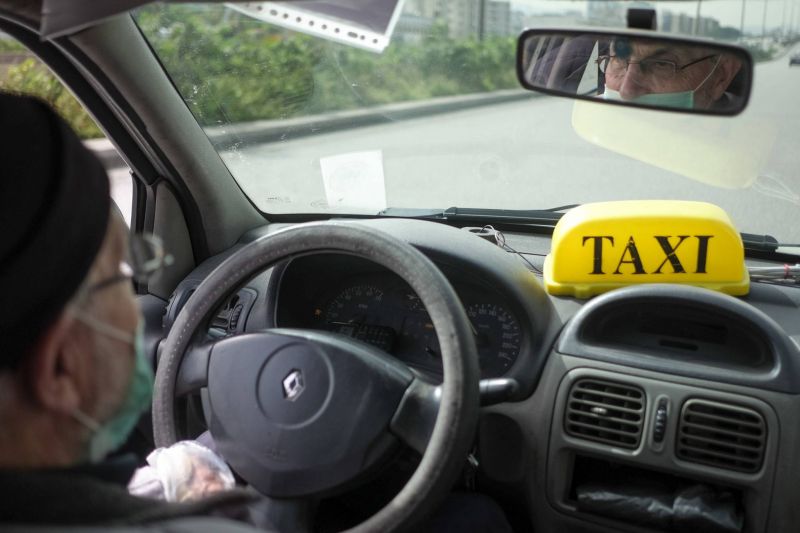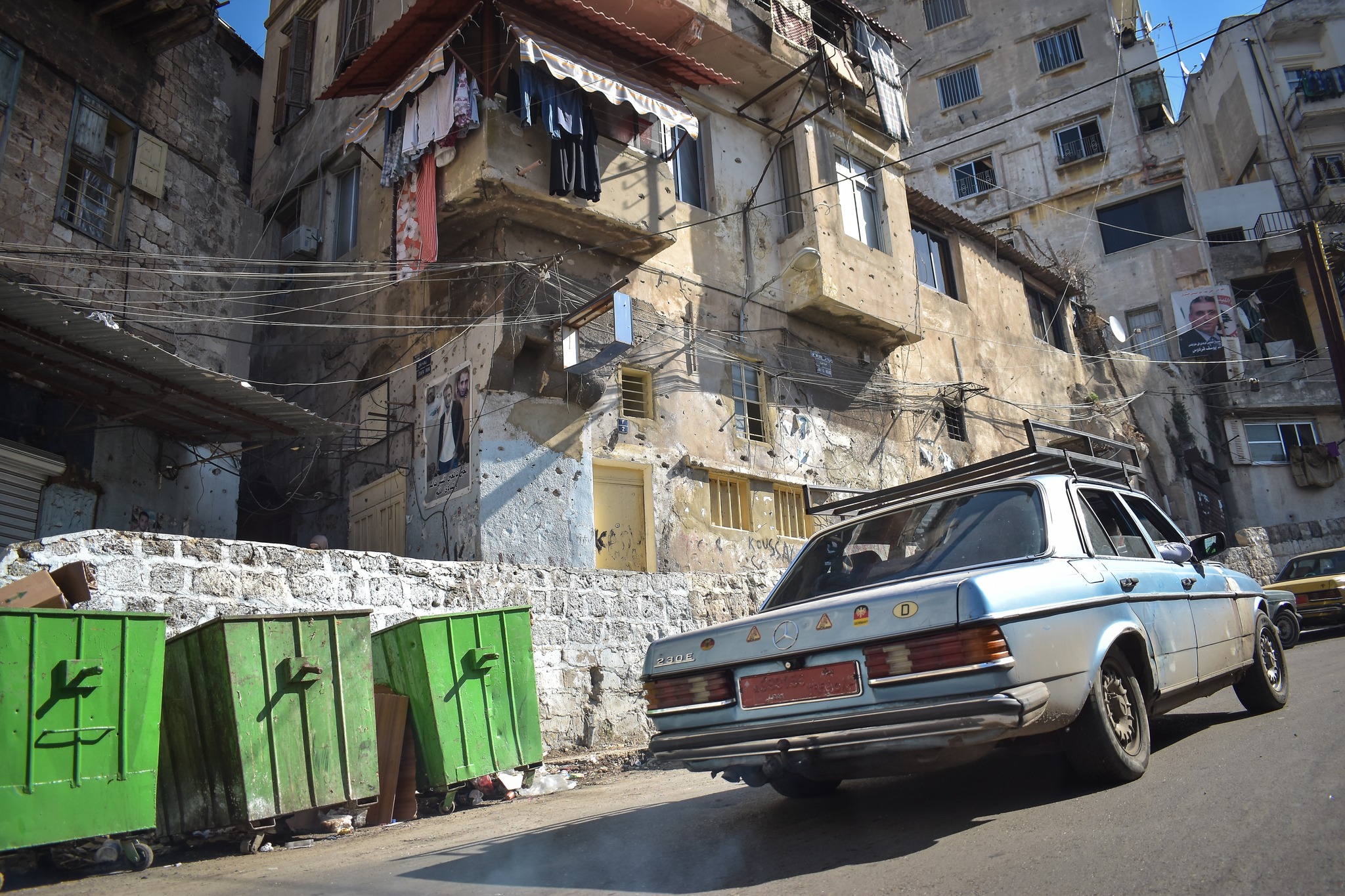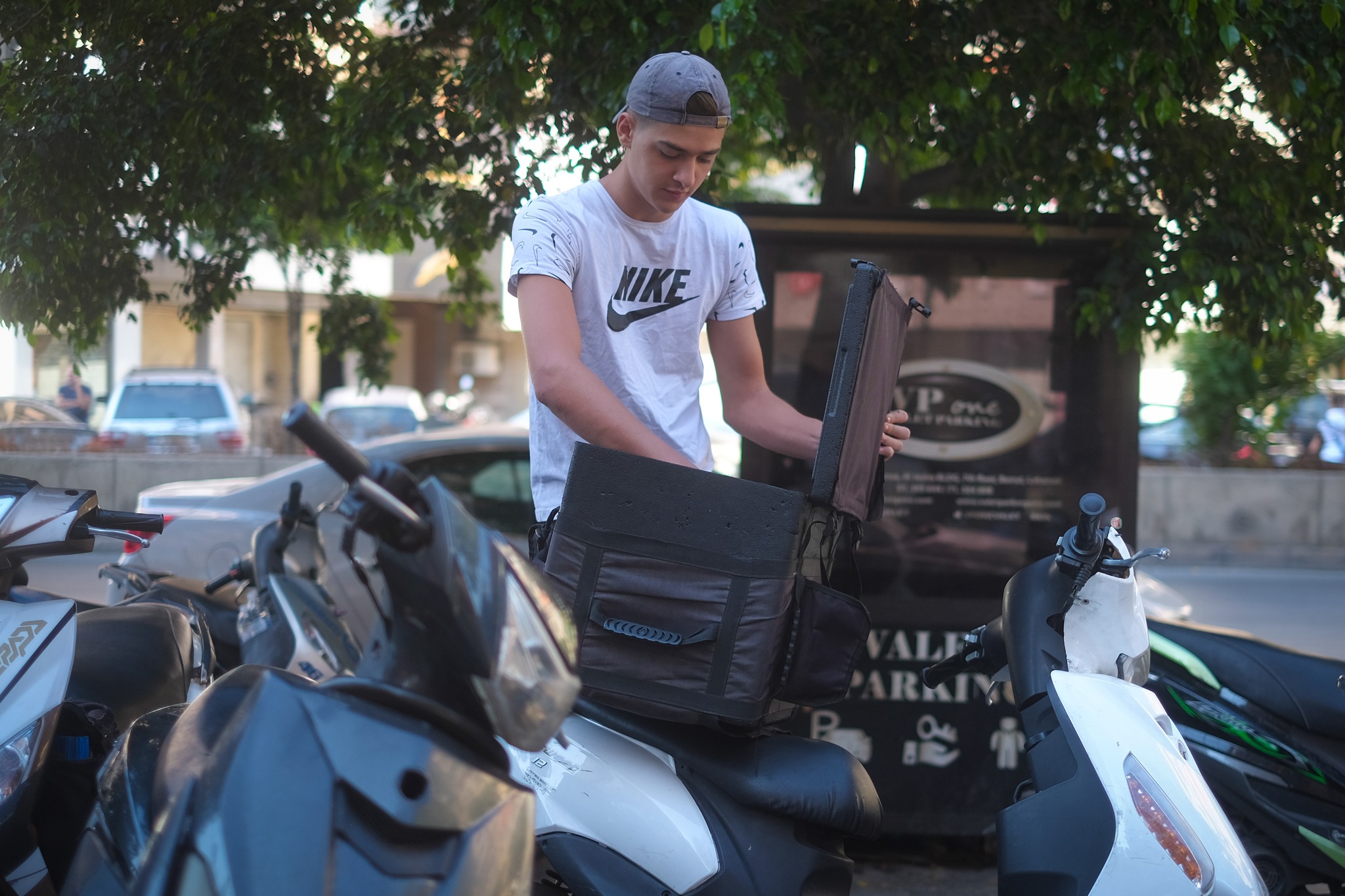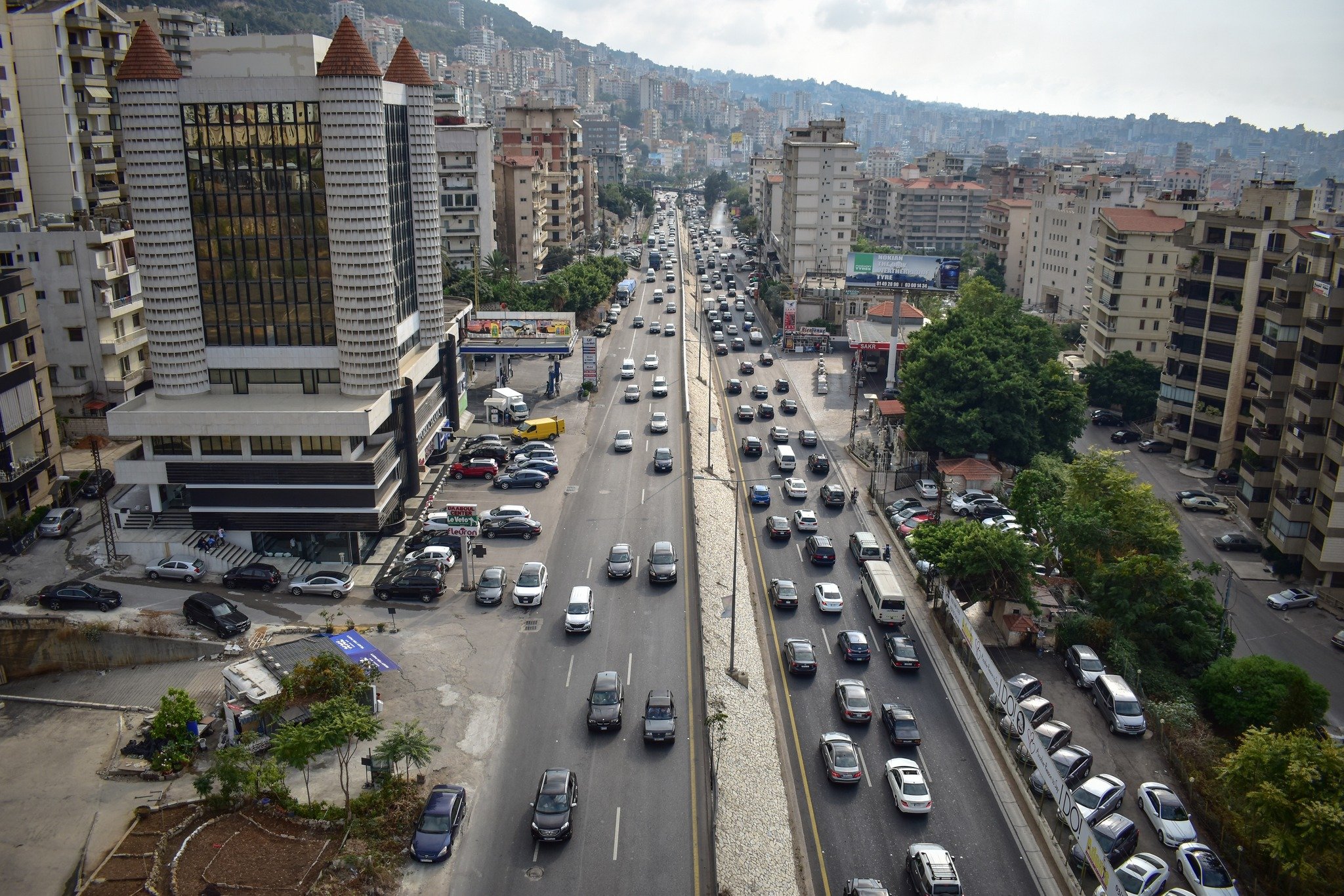
An official taxi driver in Beirut. (Credit: João Sousa/L'Orient Today)
BEIRUT — Taxi unions say they vow to continue their fight against informal drivers after their success in shuttering Bolt’s motorcycle taxi service earlier this month— the latest in a longstanding row between licensed drivers’ unions and informal drivers.
Meanwhile, informal drivers continue to operate and have expressed little anxiety around the union campaign.
The end of rideshare platform Bolt’s motorcycle service on Sept. 11 came after efforts by taxi unions to end what they say is illegal competition.
While motorcycles offer a cheaper alternative to traditional taxi services, taxi drivers’ unions point out that Lebanon’s Traffic Law does not have provisions authorizing motorcycles to work as taxis.
Two union leaders, Bassam Tleis and Darwish Taha, told L’Orient Today that taxi drivers’ unions had recently brought a complaint about the company to the Interior and Transportation ministries.
The Interior Ministry acknowledged to L’Orient Today that it received the complaint and said they forwarded it to the “concerned parties.”
Bolt said it subsequently had “several meetings” with local authorities after which it “decided to deactivate our Moto category in Lebanon.”

The battle over Bolt motorcycles is the latest in a long string of union activity trying to force electronic platforms to increase fares and allow only authorized drivers with red plates to work.
Uber and Careem entered the Lebanese market in 2014 in the face of concerted union opposition. But they targeted a high-end market, leaving the low-cost shared service taxi system largely intact for a few years until the economic crisis when drivers say most of their work migrated online. Uber was forced to adapt itself to Lebanese law, allowing only licensed taxis onto the platform.
Estonian company Bolt came to Lebanon in July 2020 and sent shockwaves through the sector by reportedly allowing drivers without taxi licenses to sign up using their private, non-taxi, vehicles —including motorcycles. This alleged practice and the lower fares offered by the company immediately triggered hostility from red-plate taxi unions who alleged illegal competition was forcing them into a race to the bottom — undermining their wages and benefits.
A December 2022 International Labour Organization (ILO) working paper reported that the entry of electronic platforms “led to a decline in the earnings of drivers” in the traditional taxi sector.
The official sector
Lebanon is home to 32,825 licensed taxis, according to the General Directorate of Land and Maritime Transport. These licensed taxis, visually distinguished by their red license plates beginning with the letter “P,” form a core part of the country’s transportation system in the absence of state public transportation.
According to a 2009 study, 35 percent of morning rush hour trips in the greater Beirut area that were not made by private cars were made by shared or private taxis.
Under the Traffic Law, taxi drivers also require a special drivers license, which the law states shall “be given to Lebanese.” Meanwhile, a number of Syrian refugees work as informal drivers and are at risk of detention.
Red plates are restricted in number and that number hasn’t been increased since 1994. People who want to enter the industry legally must buy or rent a red plate from an existing owner, typically for thousands of dollars, given that it not only gives the holder the right to work but also allows them to enroll in the National Social Security Fund’s medical and pension benefits. A vibrant parallel market has emerged to buy, sell and rent red plates.
With mandatory union membership for some official procedures, the taxi sector has a 100 percent unionization rate, according to the ILO, although drivers are fragmented into at least 13 different unions and many drivers say they rarely interact with their unions.
In recent years, taxi unions have been among Lebanon’s most visible labor organizations, with disruptive strike actions blocking traffic around the country. In May, taxi unions brought much of the capital to a standstill, calling on the government to prevent regular white plate cars from working as informal taxis and to shutter apps.
Days later, caretaker Interior Minister Bassam Mawlawi sent a written request to the Telecommunications Ministry to suspend Bolt, in particular, in Lebanon pending an investigation into whether it violates any local laws.
Two days later, the caretaker interior, transportation and telecommunications ministers met with union leader Bassam Tleis and others to discuss the circular.
Caretaker Telecommunications Minister Johnny Corm has said Mawlawi’s request could not be fulfilled because the ministry cannot block a platform without a court order.
Red plate drivers’ grievances
To red-plate drivers, competition from white-plate drivers is unfair. The complaint is longstanding, according to Chadi Faraj, a co-founder of the transportation justice NGO “Riders Rights.”
“I need to pay $35 at the end of every month for the rent of my plate number and I need to pay for social security every few months. Drivers with white plates do not have to pay such expenses,” said Nader al-Hajj Hussein, a red-plate Bolt driver interviewed by L’Orient Today.
“Taxi drivers should only have red plates. A red plate costs between $4,000 and $7,000. Those with white plates are negatively affecting our jobs,” said Saad, another red-plate Bolt driver who declined to give his last name.
Michel Faddoul, a red plate driver for a local taxi company, which typically brings in fewer earnings for employees than the ride-share apps, agreed with this sentiment. He argued that taxis with white plates are taking some of the licensed taxis’ customers.

Despite the fact that Faddoul works for a private company, he makes almost as much as Saad and al-Hajj Hussein. Faddoul noted that he makes between $225 and $340 per month.
All of these drivers are union members but agreed that the taxi drivers’ unions are not protecting them.
Faddoul believes that his union is controlled by traditional political parties. “The syndicate does not protect me as it should because it is politicized … the head of the syndicate usually belongs to a political party,” he said.
Al-Hajj Hussein and Saad also criticized their unions but for other reasons. Al-Hajj Hussein said he believes that the union is not protecting the rights of drivers because it allows prices in the market that are too low to offset skyrocketing fuel prices.
“The fuel tank will reach LL2,000,000; one liter of fuel is around LL95,000 right now. A service ride costs LL150,000 and I need around two to three liters for such a ride, so sometimes I do not make profit,” said Al-Hajj Hussein.
Al-Hajj Hussein, who works 10 hours per day, said he makes less than $300 in profit per month. “If I gain LL4,000,000 from customers per day, I need to pay LL2,500,000-3,000,000 for fuel. Now I broke one of my car’s lamps and it costs $7 to repair it. I only have two solutions, either I fill my car with fuel and continue working or I repair the lamp but I would not be able to buy fuel.”
Saad also complained about the lack of pricing policies. “The committee does not set the prices of taxis and service as they should be doing; every driver proposes the price he sees fit … the ministry or those concerned should unify prices because a lot of applications and groups are being created and are affecting the market.”
If “this committee was protecting the rights of drivers, it would not allow for the ‘illegal’ companies like Bolt and Uber to work,” Saad added, saying he believes it should also ban the informal taxi companies that are run via Whatsapp groups.
Low monthly profits are the root of the drivers’ frustration.
“I work around 12 to 13 hours per day and I could not pay for my [expenses] last month. I borrowed money to pay for it. My rent is $500 and I barely make $300 per month, which I use to pay house expenses, electricity and other costs,” Saad exclaimed.
Razan Hilal, a Bolt customer in Beirut who uses the app’s car option three times a month, agreed that the system was unfair to red-plate taxi drivers.
Razan told L’Orient Today that “white plates are surely unfair.”
“Red plates are bought to be able to monetize them legally. It is unfair for those who pay more for their plate. Either all should be white plates or all red plates,” she added.
But stopping motorcycles and white-plate taxis will prove to be an uphill battle, according to activist Faraj. “There’s a need, and where there’s a need, there’s going to be a market,” he said.
“Bolt opened the market and it exists. If Bolt stops, other applications will come. So I think this decision is pointless. All they’re doing is changing the platform and annoying people.”
In addition to the decision’s impracticality, there are concerns about its fairness. Noting that informal taxis have always existed, Faraj asked, “Now that there’s an economic crisis and people are trying to get second and third sources of income, now the government wants to enforce the laws? Against soldiers and police officers, and others who are driving for Bolt to supplement their income? This is oppressive.”
“Everyone has a right to work, whether Lebanese or not.”
Informal drivers unphased
The closure of Bolt’s motorcycle service has led to other motorcycle services popping up over the past two weeks to replace it, like Whatsapp groups, which are likely to be harder for unions to pinpoint and negotiate with than a single corporation.
Ziad al-Fares has been running a motorcycle taxi service for the past six months and he said that Bolt’s exit from the market has tripled his clientele as users who became reliant on motorcycle taxis migrated off the app.
“Lebanese people are against everything; any new idea, we are against it without thinking about it,” he said. In his view, Bolt didn’t affect traditional taxis because it served a different clientele, who wanted speed and low prices over other factors.
“Bolt created customers, it didn’t take them from the red plates.”
He opposed any government effort to remove motorcycle taxis from the market in light of the country’s notorious traffic problems and the work opportunities motorcycle taxis are creating for drivers.
In addition to Whatsapp groups, users are now moving to an app called TaxiF, which also has a motorcycle option.
Sharaf Ismail, a man living in Beirut, used Bolt Moto frequently before its closure. After Sept. 11, he has been contacting his friend, who used to work in Bolt’s moto category, every time he wants to go somewhere. He shared his friend’s number with many people.
Khaled Sharab, a motorcycle driver who worked with Bolt until Sept. 11, said that he is now getting more fares than he did before. He relies on his own clients who contact him directly.
 Motorcycle driver in Beirut. (Credit: João Sousa/L'Orient Today)
Motorcycle driver in Beirut. (Credit: João Sousa/L'Orient Today)
“I am making more money and I have more orders [now] … Sometimes in two hours I could not make any order with Bolt. Now in two hours I am making four to five orders. I currently cover my expenses for the day by working only two hours. People are ordering motos on Whatsapp instead of ordering cars on Bolt because motos are faster than cars.”
“Bolt closed [the moto category] but a million other Bolts can be opened,” Sharab continued.
“The Whatsapp group includes people who used to work with Bolt before. We all know each other and decided to make this group. There are 30 drivers in the group.”
Mohammad, a man in his 20s living in Beirut, used Bolt’s motorcycle option until Sept. 11 and is now using TaxiF.
“After Bolt stopped its moto category, I ordered a moto through a Whatsapp group only once,” he said.
He then started using “TaxiF” after a Bolt driver told him about it. According to Mohammad, “this app is around LL30,000 cheaper than Bolt.” However, he said “it still needs a lot of work as Bolt was smoother.”
Mohammad also provided L’Orient Today with information about a new Whatsapp group created by an Achrafieh resident. He found it through a TaxiF driver.
The creator of the group’s role is to “receive calls from customers and to inform drivers about orders,” said Mohammad. “[The] group functions in the same way traditional taxi companies work.”
Red plate victories and the battles to come
Darwish Taha, head of an informal committee of smartphone app drivers that hopes to form an official union, told L’Orient Today that the decision to end Bolt Moto was the result of the taxi drivers unions’ formal complaint and the payoff of a long series of campaigns, strikes and legal and political pressure.
“We achieved our demand,” he said the day Bolt Moto ended service.
“This is our right, our right is legitimate as public drivers. It doesn’t suit us that motorcycles work as an alternative to us or transport passengers,” he added.
This is not the first time workers claimed a victory against Bolt. Taha said they previously “stopped” Bolt’s alleged practice of allowing white plate cars onto the platform.
“We spoke with the company and we stopped all the private cars more or less,” he said. “As soon as we finished with that, we started on the motorcycles.”

A September 2021 snapshot of Bolt’s driver requirements webpage that said drivers must provide their “driving license” was updated in August 2022 to read “commercial license.” Bolt’s current vehicle requirements also specify the need for red plates.
Bolt did not respond to a detailed question about if, when and why white-plate cars on its platform have been banned, but the company previously denied violating Lebanese law.
“Shortly we will have a campaign against private cars that taxi offices are employing,” Taha said. “A large number of local taxi companies inside Lebanon have private cars they are employing.”
Bassam Tleis, head of the Land Transportation Federations, also foreshadowed continued agitation.
“We will confront every legal violation and infringement on the transportation sector and we will continue to confront it till the end because this Bolt, and these fake applications, don’t have a place in the law … We are continuing to the end, not just with [Bolt], until it and others stop.”
Asked whether non-red-plate taxis were really impacting the labor conditions for red-plate drivers, Tleis was firm: “All procedures and processes contrary to law, of course, negatively affect the work of public drivers.”
Faraj isn’t so sure. “There’s maybe 1,000 motorcycles in the market. What are 1,000 motorcycles going to do to the market as a whole?”
He called for a reorganization of the sector in a way that gives red plate drivers their rights without prejudicing other rights for other people.
“You need a state,” said Tleis. “Once there is a state there will be organization and enforcement of the law. The solution is enforcement of the law.”